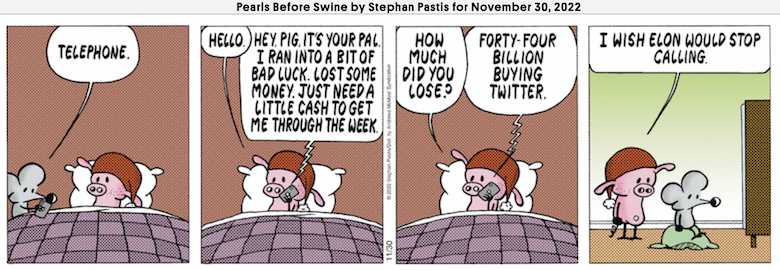The comic strip Pearls Before Swine took aim at the financial situation that Elon Musk faces after purchasing Twitter.
As I understand it, Musk paid $44 billion for the purchase. $27 billion was put up by him and $4 billion by other investors, while $13 billion was borrowed. This is what is known as a ‘leveraged buyout’ in that it is the company that is being bought that borrows the money, not the buyer. So if the loans go into default, it is Twitter that is on the hook, not Musk personally. This strikes me as a bit weird but what do I know about high finance? It appears that the banks seem to think that Musk will not drive the value of Twitter below the $13 billion valuation so that they can recoup their loan even if things go south.
Anyway, Twitter now has to at least pay the interest on the loan back to the banks. Assuming a 5% interest rate, that amounts to $650 million per year. He is charging $8 per month for the various check marks that he is dishing out or about $100 per year, which means that he needs about 6.5 million subscribers just to pay the interest alone. That seems an unlikely target, since currently there are just over 400,000 people who had the free checks. The Twitter user base is estimated at over 200 million but those in the US amount to just 37 million. It is unlikely that Musk will get many subscribers outside the US.
That calculation also assumes that Twitter retains its current advertising revenue which was had a highest ever level of $4.5 billion last year. But the withdrawal by advertisers concerned about the chaotic state of the company has been estimated to have cost about half the current revenue or about $2 billion. Musk has fired an estimated half to two-thirds of employees, perhaps saving as much as $1 billion. That will offset some of the revenue loss but not all. Some advertisers will no doubt return to the platform but that will depend on how well the company is run and with many of the people gone, there is bound to be a deterioration in services, in basic operational terms in addition to his unleashing of the trolls and bots and misinformers that had previously been suspended.
Content moderation is one of the thorniest problems facing social media sites.
As the “chief twit” may be learning, running a global platform with nearly 240 million active daily users requires more than good algorithms and often demands imperfect solutions to messy situations – tough choices that must ultimately be made by a human and are sure to displease someone.
…While Europe has imposed rules requiring social media platforms to create policies on misinformation and hate speech, Goldman noted that in the U.S. at least, loose regulations allow Musk to run Twitter as he sees fit, despite his inconsistent approach.
“What Musk is doing with Twitter is completely permissible under U.S. law,” Goldman said.
Pressure from the EU may force Musk to lay out his policies to ensure he is complying with the new law, which takes effect next year. Last month, a senior EU official warned Musk that Twitter would have to improve its efforts to combat hate speech and misinformation; failure to comply could lead to huge fines.
After Musk fired most of the content moderation team, he seems to be personally making decisions as to who should be on the platform, using meaningless polls to justify his actions, hardly a long-term solution. So far, all his actions seem to have been designed to please right-wingers and trolls who spew hate by allowing those who had been suspended for violating policies back on the platform, most notably Donald Trump, Marjorie Taylor Greene, and Covid misinformation spreaders. Musk may be expecting that they will have his back when things get ugly, as they assuredly will.
The key question is how much ugliness advertisers will tolerate because they, after all, is the audience he really has to placate.



Seems kinda forced, to me.
Not like Elon is asking for donations from the public, as this intimates.
(Nor is it like he’s crying poor, either)
—
Honestly, by the standards of the strips I’ve seen featured here, these seem kinda of perfunctory. Topical, I grant, but still. Not much effort spent, clearly.
Mmm, not really a partecipant in all of this strange episode, as I am not on Twitter and never will be. My grain of sand:
-- the financials look iffy, but then the whole social media sector is like that. Companies whose income depend so much from advertising (Farcebook/meta by 99%, Google by 80%) are not what you call solid, and everything looks as stable as a wobbly bicycle. No idea how it’s going to end.
-- as for moderation, sites such as those are designed to fail from the start. No way of stopping haters/griefers/*hitlords and such, unless you hire like one million controllers. There’s just too many people online, and among them too many idjits.
-- obviously the founders of such sites care nothing about this, the purpose is to earn tons of money quickly, no other consideration applies. The disconnect between public declarations and reality is jarring, the hypocrisy and cynicism hideous.